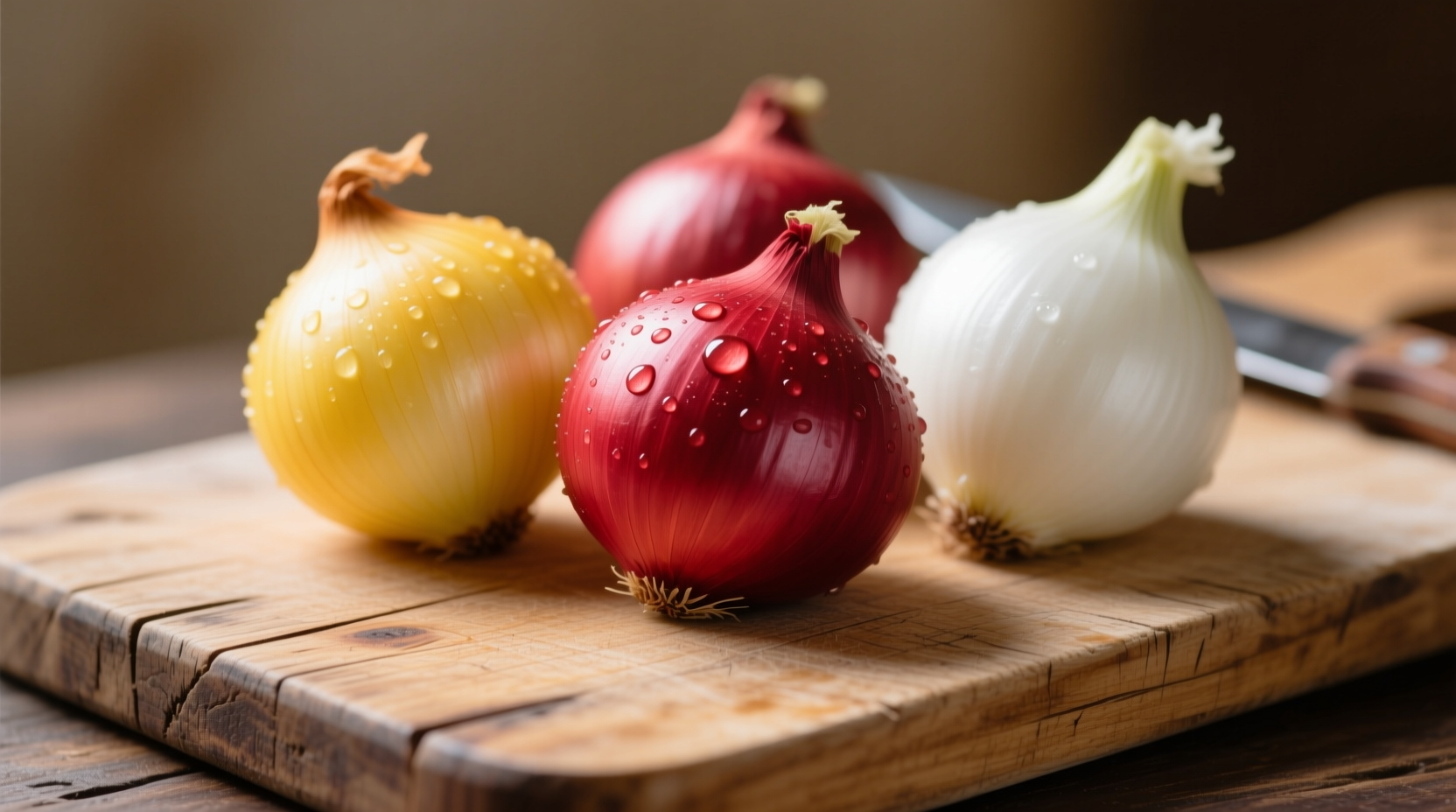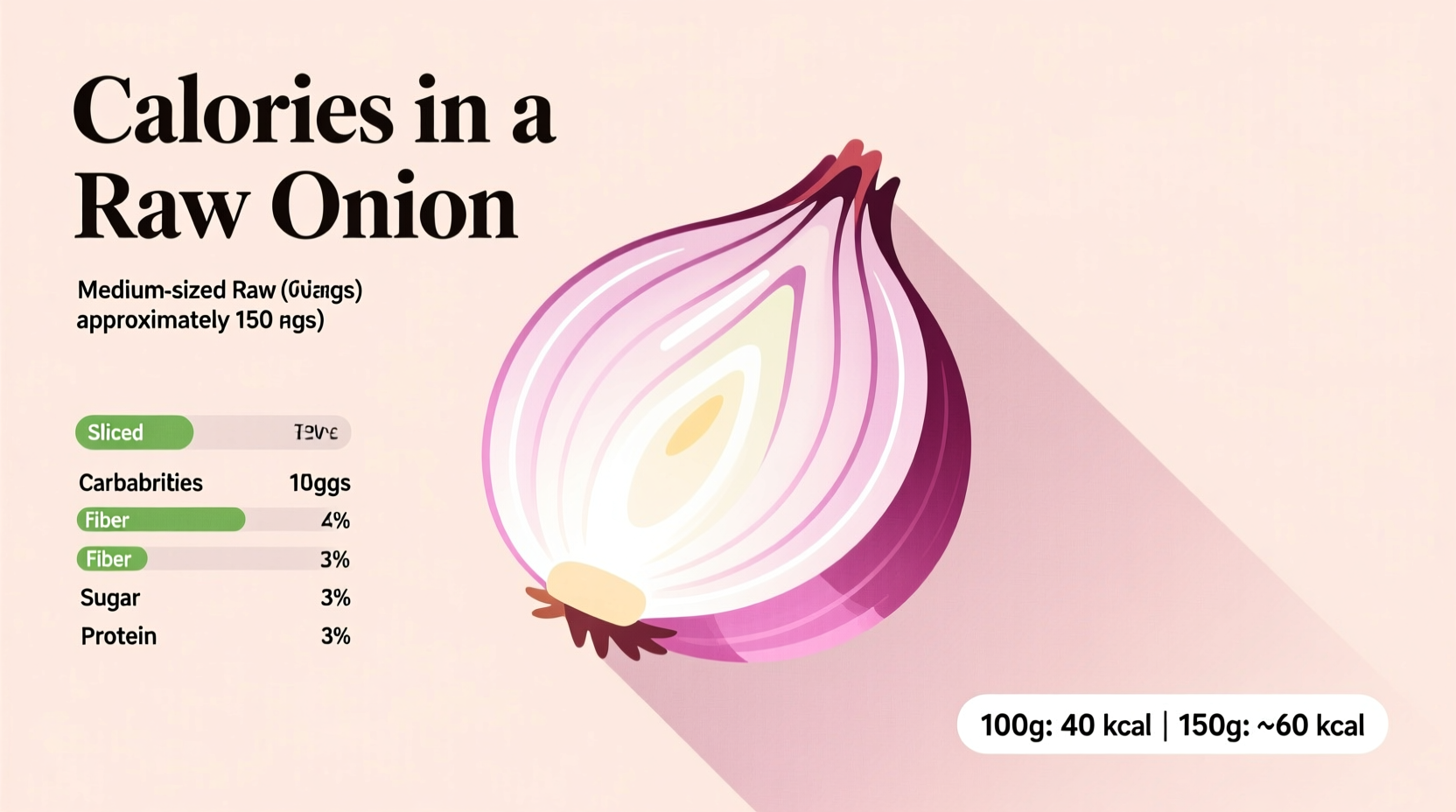A medium-sized onion (110g) contains approximately 44 calories, with virtually no fat and just 10g of carbohydrates. This comprehensive guide breaks down calorie counts by onion type and size, provides verified nutritional data from USDA sources, and explains how onions fit into balanced diets.
Curious about onion nutrition? Whether you're tracking macros, managing diabetes, or simply cooking smarter, knowing the exact calorie content of onions helps make informed dietary choices. This guide delivers science-backed facts you can trust, with practical applications for everyday cooking and meal planning.
Onion Calorie Breakdown by Type and Size
Not all onions are created equal when it comes to calories. The exact count depends on variety, size, and preparation method. Here's the verified nutritional data from the USDA FoodData Central database:
| Onion Type | Size/Weight | Calories | Carbohydrates | Key Nutrients |
|---|---|---|---|---|
| Yellow Onion (raw) | Medium (110g) | 44 | 10g | Vitamin C (11% DV), Fiber (15% DV) |
| Red Onion (raw) | Medium (110g) | 42 | 9.8g | Anthocyanins, Quercetin (antioxidants) |
| White Onion (raw) | Medium (110g) | 43 | 10.2g | Higher sulfur compounds |
| Green Onions (scallions) | 1 cup (100g) | 32 | 7.3g | Vitamin K (207% DV), Vitamin A |
| Caramelized Onions | 1/2 cup (80g) | 85 | 20g | Concentrated natural sugars |
This nutritional comparison reveals why yellow onions remain the most commonly used variety in cooking—they offer the best balance of flavor and nutritional value. The USDA's National Nutrient Database for Standard Reference provides these standardized measurements that nutrition professionals rely on for accurate dietary planning.
What Affects Onion Calorie Content?
Several factors influence the actual calories you consume:
- Preparation method: Raw onions maintain their natural calorie count, while caramelizing concentrates sugars and increases calories per volume
- Size variations: Onions range from 50g (small) to 150g (large), directly impacting total calories
- Water content: Onions are 89% water, which affects density and portion measurements
- Storage conditions: Older onions develop higher sugar content as starches convert
According to research published in the Journal of Food Composition and Analysis, the carbohydrate composition of onions changes during storage, with fructose levels increasing by up to 15% over three months. This means that an onion stored for several weeks contains slightly more calories than when freshly harvested.
Nutritional Benefits Beyond Calories
Onions deliver impressive nutritional value far beyond their modest calorie count:
- Fiber content: One medium onion provides 15% of your daily fiber needs, supporting digestive health
- Antioxidant power: Red onions contain anthocyanins that provide 2x the antioxidant activity of yellow varieties
- Vitamin C: Essential for immune function and collagen production
- Quercetin: A flavonoid with anti-inflammatory properties studied for cardiovascular benefits
The American Journal of Clinical Nutrition highlights onions as part of the "Allium vegetable" family, which research associates with reduced risk of certain cancers. Their low glycemic index (10) makes them suitable for diabetes management when consumed in appropriate portions.

Practical Applications for Healthy Eating
Understanding onion calories helps optimize their use in various dietary approaches:
For Weight Management
With just 44 calories per medium onion, they add volume and flavor to meals without significant caloric impact. Try these strategies:
- Replace half the ground meat in burgers with finely diced onions
- Add raw onions to salads for crunch instead of croutons
- Use caramelized onions as a flavor base instead of oil or butter
For Diabetes Management
The American Diabetes Association recommends onions as a non-starchy vegetable. One medium onion contains about 10g carbohydrates, which fits within most meal carb budgets. Pair onions with protein sources to minimize blood sugar impact.
Keto Diet Considerations
While onions contain carbohydrates, small portions (1-2 tablespoons of minced onion) can fit within keto macros. Green onions offer a lower-carb alternative with just 0.7g net carbs per tablespoon.
Common Misconceptions About Onion Nutrition
Several myths persist about onion calories and nutrition:
- Myth: Cooking significantly increases onion calories
Fact: While caramelizing concentrates sugars, the actual calorie increase comes from added fats, not the onion itself - Myth: All onion varieties have identical nutritional profiles
Fact: Red onions contain significantly more antioxidants than yellow varieties - Myth: Onions cause weight gain
Fact: At 44 calories per medium onion, they're actually weight-loss friendly when used to enhance flavor without added fats
Registered dietitians emphasize that the sulfur compounds in onions may actually support metabolism. A study in Nutrition Research found that Allium vegetables like onions positively influence gut microbiota composition, which affects how our bodies process calories.
Maximizing Nutritional Value in Cooking
How you prepare onions affects their nutritional benefits:
- Raw consumption: Preserves maximum vitamin C and quercetin content
- Light cooking: Brief sautéing (3-5 minutes) maintains most nutrients while improving digestibility
- Avoid overcooking: Prolonged high heat destroys heat-sensitive compounds
- Pair with healthy fats: Combining onions with olive oil enhances absorption of fat-soluble compounds
Food science research shows that chopping onions and waiting 10 minutes before cooking allows beneficial compounds to fully develop. This simple technique can increase the quercetin content by up to 25% according to studies published in the Journal of Agricultural and Food Chemistry.
How Onions Compare to Other Common Vegetables
Understanding where onions fall in the vegetable spectrum helps with meal planning:
- Lower calorie than: Potatoes (163 calories per medium), corn (134 calories per cup)
- Similar calorie range to: Bell peppers (31 calories each), zucchini (20 calories per 100g)
- Higher fiber than: Cucumbers, lettuce, celery
This positioning makes onions an excellent choice for adding flavor and nutritional value without excessive calories—a key consideration for those following calorie-controlled diets.











 浙公网安备
33010002000092号
浙公网安备
33010002000092号 浙B2-20120091-4
浙B2-20120091-4